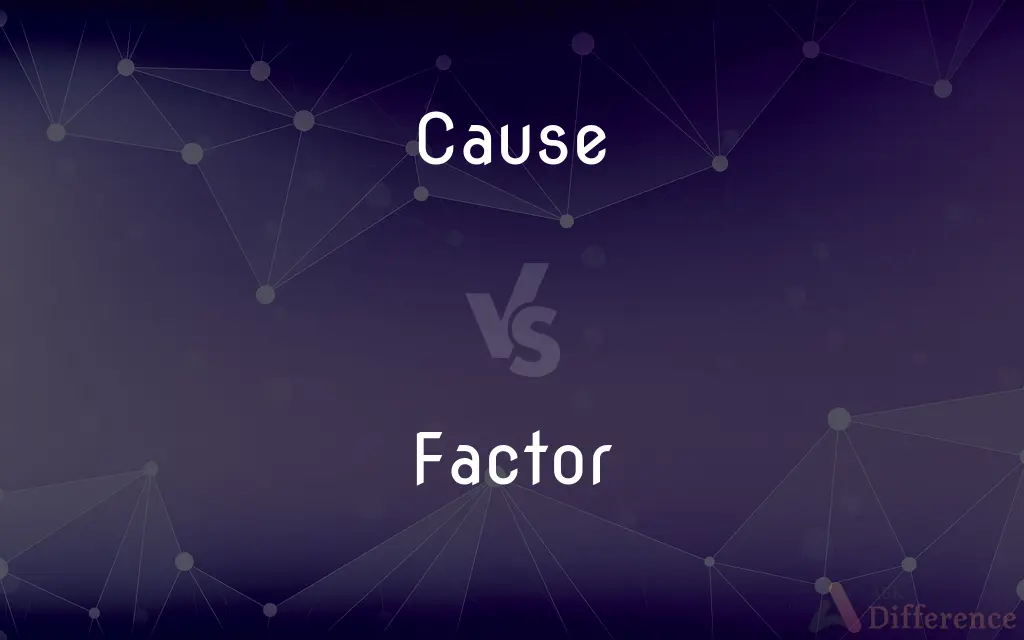Cause vs. Factor — What's the Difference?
By Tayyaba Rehman & Fiza Rafique — Updated on March 14, 2024
A cause directly produces an effect or outcome, while a factor contributes to but does not directly create the outcome.

Difference Between Cause and Factor
Table of Contents
ADVERTISEMENT
Key Differences
A cause is an element or action that directly leads to a specific outcome or effect, serving as the primary reason for an event's occurrence. On the other hand, a factor is a circumstance, condition, or element that contributes to a result but may not directly cause it on its own.
While causes are often seen as the direct influencers that can be clearly linked to an effect, factors play a more contributory role, implying that they are part of a larger set of conditions that lead to an outcome. Factors may influence the likelihood or severity of an outcome but do not guarantee its occurrence without the presence of a direct cause.
In identifying the reasons behind events or outcomes, distinguishing between causes and factors is crucial. Causes are targeted for interventions to prevent or replicate outcomes, whereas understanding factors helps in adjusting conditions to influence the probability of outcomes.
The relationship between a cause and its effect is typically more straightforward and linear, making it easier to predict outcomes based on specific causes. Factors, however, interact in complex ways with other elements, making their impact on outcomes less predictable and often requiring a broader analytical approach.
Both causes and factors are integral to understanding phenomena, with causes providing a clear line of action for change or prevention, and factors offering insights into the conditions that favor or deter certain outcomes. This distinction is particularly important in fields like medicine, psychology, and environmental science, where understanding the nuances between causes and factors can guide effective decision-making and interventions.
ADVERTISEMENT
Comparison Chart
Definition
Directly produces an outcome.
Contributes to but does not directly cause an outcome.
Role in Outcome
Primary reason for an event's occurrence.
Influences the likelihood or severity of an outcome.
Predictability
Direct and linear relationship with outcomes.
Complex interactions make impacts less predictable.
Example
Smoking is a cause of lung cancer.
Genetics is a factor in the development of lung cancer.
Importance
Targeted for interventions to change outcomes.
Considered to adjust conditions influencing outcomes.
Compare with Definitions
Cause
Essential for understanding direct relationships.
Wearing seat belts reduces fatalities in car accidents.
Factor
Helps in understanding broader contexts.
A balanced diet is a factor in maintaining good health.
Cause
Directly actionable in strategies for change.
Reducing exposure to sunlight can prevent sunburn.
Factor
Considered in strategies to modify risk or potential.
Exercise is a factor in reducing the risk of heart disease.
Cause
Can often be isolated for study or intervention.
A bacteria can be the cause of an infection.
Factor
Influences outcomes without directly causing them.
Age is a factor in the risk of developing certain diseases.
Cause
Basis for preventive or corrective actions.
Vaccination causes immunity to certain diseases.
Factor
Often part of a complex set of conditions.
Socioeconomic status is a factor in educational achievement.
Cause
The one, such as a person, event, or condition, that is responsible for an action or result.
Factor
A number or quantity that when multiplied with another produces a given number or expression
An amount that exceeds it by a factor of 1000 or more
Cause
A direct instigator of an effect or outcome.
The cause of the fire was a lightning strike.
Factor
A contributing element to a situation or outcome.
Stress is a factor in many health conditions.
Cause
Because.
Factor
A circumstance, fact, or influence that contributes to a result
His skill was a factor in ensuring that so much was achieved
She worked fast, conscious of the time factor
Cause
The producer of an effect, result, or consequence.
Factor
A level on a scale of measurement.
Cause
A basis for an action or response; a reason
The doctor's report gave no cause for alarm.
Factor
An agent who buys and sells goods on commission
His father was chief factor for the Hudson's Bay Company
Cause
A goal or principle served with dedication and zeal
“the cause of freedom versus tyranny” (Hannah Arendt).
Factor
Another term for factorize
Last year researchers factored a number 155 digits long
Cause
The interests of a person or group engaged in a struggle
“The cause of America is in great measure the cause of all mankind” (Thomas Paine).
Factor
(of a company) sell (its invoices) to a factor
They collected rents while he factored these forfeited estates
Cause
A lawsuit or criminal prosecution.
Factor
One that actively contributes to an accomplishment, result, or process
"Surprise is the greatest factor in war" (Tom Clancy).
Cause
The ground or basis for a lawsuit.
Factor
One who acts for someone else; an agent.
Cause
A subject under debate or discussion.
Factor
One who purchases accounts receivable at a discount.
Cause
To be the cause of or reason for; result in.
Factor
(Mathematics) One of two or more quantities that divides a given quantity without a remainder. For example, 2 and 3 are factors of 6; a and b are factors of ab.
Cause
To bring about or compel by authority or force
The moderator invoked a rule causing the debate to be ended.
Factor
A quantity by which a stated quantity is multiplied or divided, so as to indicate an increase or decrease in a measurement
The rate increased by a factor of ten.
Cause
The source of, or reason for, an event or action; that which produces or effects a result.
They identified a burst pipe as the cause of the flooding.
Factor
A gene. No longer in technical usage.
Cause
Sufficient reason for a state, as of emotion.
There is no cause for alarm.
The end of the war was a cause for celebration.
Factor
To determine or indicate explicitly the factors of
If you factor 70, you get 2, 5, and 7.
Cause
(countable) A goal, aim or principle, especially one which transcends purely selfish ends.
Factor
To engage in purchasing accounts receivable at a discount.
Cause
(obsolete) Sake; interest; advantage.
Factor
(obsolete) A doer, maker; a person who does things for another person or organization.
The factor of the trading post bought the furs.
Cause
Any subject of discussion or debate; a matter; an affair.
Factor
An agent or representative.
Cause
A suit or action in court; any legal process by which a party endeavors to obtain his claim, or what he regards as his right; case; ground of action.
Factor
(legal)
Cause
(transitive) To set off an event or action.
The lightning caused thunder.
Factor
A commission agent.
Cause
(ditransitive) To actively produce as a result, by means of force or authority.
His dogged determination caused the fundraising to be successful.
Factor
A person or business organization that provides money for another's new business venture; one who finances another's business.
Cause
(obsolete) To assign or show cause; to give a reason; to make excuse.
Factor
A business organization that lends money on accounts receivable or buys and collects accounts receivable.
Cause
Alternative form of 'cause; because
Factor
One of the elements, circumstances, or influences which contribute to produce a result.
The greatest factor in the decision was the need for public transportation.
The economy was a factor in this year's budget figures.
Cause
That which produces or effects a result; that from which anything proceeds, and without which it would not exist.
Cause is substance exerting its power into act, to make one thing begin to be.
Factor
(mathematics) Any of various objects multiplied together to form some whole.
3 is a factor of 12, as are 2, 4 and 6.
The factors of the Klein four-group are both cyclic of order 2.
Cause
That which is the occasion of an action or state; ground; reason; motive; as, cause for rejoicing.
Factor
(causal analysis) Influence; a phenomenon that affects the nature, the magnitude, and/or the timing of a consequence.
The launch temperature was a factor of the Challenger disaster.
Cause
Sake; interest; advantage.
I did it not for his cause.
Factor
(economics) A resource used in the production of goods or services, a factor of production.
Cause
A suit or action in court; any legal process by which a party endeavors to obtain his claim, or what he regards as his right; case; ground of action.
Factor
(Scotland) A steward or bailiff of an estate.
Cause
Any subject of discussion or debate; matter; question; affair in general.
What counsel give you in this weighty cause!
Factor
(transitive) To find all the factors of (a number or other mathematical object) (the objects that divide it evenly).
Cause
The side of a question, which is espoused, advocated, and upheld by a person or party; a principle which is advocated; that which a person or party seeks to attain.
God befriend us, as our cause is just.
The part they take against me is from zeal to the cause.
Factor
To be a product of other objects.
Cause
To effect as an agent; to produce; to be the occasion of; to bring about; to bring into existence; to make; - usually followed by an infinitive, sometimes by that with a finite verb.
I will cause it to rain upon the earth forty days.
Cause that it be read also in the church of the Laodiceans.
Factor
To sell a debt or debts to an agent (the factor) to collect.
Cause
To assign or show cause; to give a reason; to make excuse.
Factor
One who transacts business for another; an agent; a substitute; especially, a mercantile agent who buys and sells goods and transacts business for others in commission; a commission merchant or consignee. He may be a home factor or a foreign factor. He may buy and sell in his own name, and he is intrusted with the possession and control of the goods; and in these respects he differs from a broker.
My factor sends me word, a merchant's fledThat owes me for a hundred tun of wine.
Cause
Abbreviation of Because.
Factor
A steward or bailiff of an estate.
Cause
Events that provide the generative force that is the origin of something;
They are trying to determine the cause of the crash
Factor
One of the elements or quantities which, when multiplied together, form a product.
Cause
A justification for something existing or happening;
He had no cause to complain
They had good reason to rejoice
Factor
One of the elements, circumstances, or influences which contribute to produce a result; a constituent; a contributory cause.
The materal and dynamical factors of nutrition.
Cause
A series of actions advancing a principle or tending toward a particular end;
He supported populist campaigns
They worked in the cause of world peace
The team was ready for a drive toward the pennant
The movement to end slavery
Contributed to the war effort
Factor
To resolve (a quantity) into its factors.
Cause
Any entity that causes events to happen
Factor
Anything that contributes causally to a result;
A number of factors determined the outcome
Cause
A comprehensive term for any proceeding in a court of law whereby an individual seeks a legal remedy;
The family brought suit against the landlord
Factor
An abstract part of something;
Jealousy was a component of his character
Two constituents of a musical composition are melody and harmony
The grammatical elements of a sentence
A key factor in her success
Humor: an effective ingredient of a speech
Cause
Give rise to; cause to happen or occur, not always intentionally;
Cause a commotion
Make a stir
Cause an accident
Factor
Any of the numbers (or symbols) that form a product when multiplied together
Cause
Cause to do; cause to act in a specified manner;
The ads induced me to buy a VCR
My children finally got me to buy a computer
My wife made me buy a new sofa
Factor
One of two or more integers that can be exactly divided into another integer;
What are the 4 factors of 6?
Factor
A businessman who buys or sells for another in exchange for a commission
Factor
An independent variable in statistics
Factor
(genetics) a segment of DNA that is involved in producing a polypeptide chain; it can include regions preceding and following the coding DNA as well as introns between the exons; it is considered a unit of heredity;
Genes were formerly called factors
Factor
Resolve into factors;
A quantum computer can factor the number 15
Common Curiosities
What is a cause?
A cause is a direct instigator that leads to a specific effect or outcome.
How does a cause differ from a factor?
A cause directly leads to an outcome, while a factor contributes to the likelihood or severity of an outcome without directly causing it.
Can a factor become a cause?
In certain contexts, a factor can be considered a cause if it directly leads to an outcome under specific conditions.
Why is it important to differentiate between causes and factors?
Differentiating helps in targeting interventions more effectively and understanding the complex interactions that influence outcomes.
How do causes and factors interact in health-related outcomes?
In health, causes can directly lead to diseases, while factors can influence an individual's risk or resilience to those diseases.
What is a factor?
A factor is a condition or element that influences the occurrence of an outcome but does not directly cause it.
How can identifying causes and factors help in problem-solving?
It enables more precise interventions by addressing direct causes and modifying contributing factors to achieve desired outcomes.
How do environmental studies differentiate between causes and factors?
Environmental studies identify direct causes of phenomena and consider factors as elements that influence environmental conditions and outcomes.
Can an event have multiple causes and factors?
Yes, most events or outcomes are the result of multiple causes and factors interacting in complex ways.
Are causes more significant than factors in determining outcomes?
Causes are critical for directly determining outcomes, but factors are also significant as they contribute to the context in which causes operate.
Can social factors be considered causes?
Social factors can be considered causes if they directly lead to social outcomes, though they are often seen as contributing to broader social phenomena.
Is it easier to control causes or factors in managing outcomes?
It depends on the context, but often direct causes are more straightforwardly managed or controlled than complex factors.
Why is the distinction between causes and factors blurred in some cases?
The distinction can be blurred due to the complex nature of many systems where factors and causes interact closely, making it difficult to isolate direct causes.
How can understanding factors improve preventive strategies?
By identifying and modifying factors, it's possible to reduce the likelihood of adverse outcomes or enhance positive ones.
How do policymakers use the understanding of causes and factors?
Policymakers use this understanding to develop targeted interventions for direct causes and broader policies to address contributing factors, aiming for comprehensive solutions to social, health, and environmental issues.
Share Your Discovery

Previous Comparison
Float vs. Flow
Next Comparison
Entrance vs. PortalAuthor Spotlight
Written by
Tayyaba RehmanTayyaba Rehman is a distinguished writer, currently serving as a primary contributor to askdifference.com. As a researcher in semantics and etymology, Tayyaba's passion for the complexity of languages and their distinctions has found a perfect home on the platform. Tayyaba delves into the intricacies of language, distinguishing between commonly confused words and phrases, thereby providing clarity for readers worldwide.
Co-written by
Fiza RafiqueFiza Rafique is a skilled content writer at AskDifference.com, where she meticulously refines and enhances written pieces. Drawing from her vast editorial expertise, Fiza ensures clarity, accuracy, and precision in every article. Passionate about language, she continually seeks to elevate the quality of content for readers worldwide.
















































